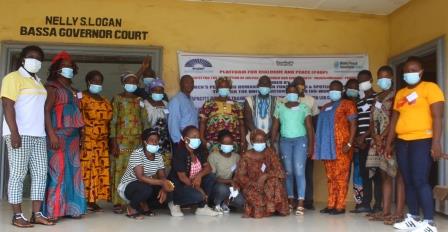BUCHANAN, GRD. BASSA – Platform for Dialogue and Peace (P4DP) under the Mobile for Women Project has commenced several capacity building trainings for women led and women’s rights community-based and civil society organizations in Grand Bassa and Montserrado Counties.
The Project is funded by Women’s Peace and Humanitarian Fund and Spotlight Initiative through the United Nations Women. The Training of Trainers (ToT) sessions are intended to expose selected beneficiary women led and women’s rights CSOs to the findings from the recent research conducted by P4DP in the two counties.
The trainings will also provide the CSOs some basic understanding on how to conduct and lead community advocacy and awareness campaigns around social and cultural norms.
Speaking at the opening session on Wednesday, May 19, 2021, in Grand Bassa County, the county Assistant Superintendent for Development, Mr. Flee Glay, admonished participants to see the training as an essential element of their operational mandates, adding “you are grassroots organizations whose participation in community based gender issues is critical to breaking down multiple barriers that women and girls face in our society. This makes it imperative for you to take the training seriously”.
Mr. Glay lauded P4DP and partners for selecting Grand Bassa County as one of the project locations. “The presence of typical rural women in this training proves to me that we are essentially getting somewhere because when these women get back to their organizations, their organizations and communities will be greatly impacted and this will lift the voices of women,” Superintendent Glay said. Also speaking, the Technical Assistant at the Ministry of Gender, Children and Social Protection, Madam Patricia Togba, praised P4DP and donors for the initiative and called for close collaboration and coordination with the ministry in these endeavors.
She said sexual and gender-based violence and gender equality are key priorities of the Government’s Pro – Poor Agenda for Development and Prosperity (PADP). “The Issues of gender is strongly emphasized under Pillar One of the PADP which is Power to the People,” Madam Togba noted.
Patricia Togba then encouraged participants and their organizations to work closely with the ministry through the office of the county Gender Coordinator, noting “we need to work together to confront the issues of gender in the country because this is how both you and the ministry will be fully aware of gender issues in communities,” she concluded.
She said the ministry is exerting enormous efforts in promoting women’s issues in the country and as such by working closely together will certainly ensure success. The Technical Assistant is one of the expert facilitators at the workshop that will make a presentation on National Gender Policy and other gender related legal frameworks.
Platform for Dialogue and Peace is a research, peace building and development oriented nongovernmental organization that promotes a safe, peaceful and integrated Liberian society by using evidence-based research and participatory action activities in both urban and rural communities.
The organization works with both state and non-state actors by jointly identifying challenges within communities and working together collaboratively to prevent, manage and transform conflict.
The trainings are currently ongoing in Buchanan, will also be replicated in Monrovia in the coming weeks, as part of the Mobile for the Promotion of Justice for Women and Girls’ Rights (Mobile4women) Project. The training comes against the backdrop of a research conducted by P4DP in 16 communities in Grand Bassa County and in the urban parts Montserrado County between August and December, 2020.
With technical Audio Visual support from Sahara Technology Solution (a Liberian information technology firm), and P4DP conducted research using an audio visual technique which, among others, established that women and girls are directly marginalized based on social, cultural and religious norms and practices.
For instance, the study noted that 61 percent of respondents pointed out limited participation of women in community leadership as the most prevalent form of marginalization of women, while 23 percent cited low women’s participation in family decision making and 16 percent attributed women’s marginalization to a variety of other factors.
The research further revealed that 59 percent of respondents believed that marginalization is being driven by gender differential, while 29 percent attributed its main driver to culture, with 8 percent and 4 percent insinuating religion and ethnicity, respectively.
In the study, most respondents contended that men use bride price as a form of marginalization, especially in rural communities, believing that because women come to live in the homes of men and men pay the bride price to the families of the brides, husbands thus claim dominion over wives.
The study also discovered that most men, particularly in rural areas, perceived bride price for the bride as buying of the woman. It was also discovered that even in most urban areas where majority of women are the breadwinners, their men still exercise oversight role in final decision making in the homes.
To this end, the study asserted that men believe women do not have the right to question their decisions and once the decisions are questioned, they become annoyed which leads to physical, emotional and economic violence against women.
In both counties, the study found that access to justice remains a major problem especially for vulnerable women for whom most cases of gender based violence are either not reported to the police or are reported and ended up being compromised.
The study however, noted that respondents differed on their preferences which showed that 56 percent preferred the customary justice system, while 44 percent rather favored the statutory system.
Respondents with preference for the customary system believed that the system is easily accessible and more reliable while those who opted for the statutory justice system said their preference is based on the system’s fairness and easy accessibility.

